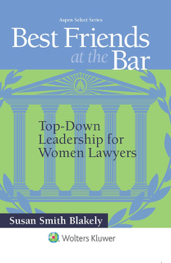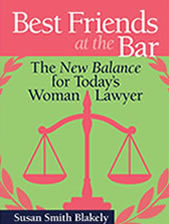Here is some very good advice from judges that I want to pass on to you. If you are a young woman trial lawyer, pay attention. If you are a young woman law student who is taking trial practice or involved in practice clinics, pay attention. And if you are a young woman lawyer who has any contact with judges and courtrooms, pay attention. Rarely are judges this candid.
The judges in this case happen to be Virginia judges. That is no coincidence for me. I am a Virginia lawyer, and I spent all of my litigation years in Virginia firms. I am also a DC lawyer, but that is truly a horse of another color. The practices, even in the local courts, are very different, and I have to say that I learned most of my best lawyering skills in Virginia.
I was reminded of these things when I read the most recent edition of the Virginia Lawyers Weekly and the article captioned “Tips from the bench at the VTLA meeting”. The VTLA is the Virginia Trial Lawyers Association, a well-respected group that has a similar counterpart in most other states. I want to share some of it with you because it is just good common sense for trial lawyers.
Virginia judges can be tough. They are of the “in and out” ilk, and you can find yourself involuntarily out of court in a heartbeat if you do not heed their warnings about efficient practice. The federal courts in Virginia that I practiced in were similar, and my days of practice before one notorious Federal Judge in the Eastern District of Virginia were instructive and interesting, at best. I became used to being addressed as “little girl” and “woman” while fighting for my professional life in his courtroom. However, it was the early 1980’s, and all has been forgiven.
Virginia can be a challenging jurisdiction for courtroom procedure. We learned early and hard that law and equity were not properly presented in the same action in Virginia—although, thankfully, that has changed since. We also learned that all contracts in the day had to be “under seal”—which was not really a seal at all but a statement and somehow reminiscent of King John and the Magna Carta and Jolly Old England. That, too, is a thing of the past but a reminder of the dedication to formality in the courts of the Commonwealth.
However, there is a lot of good that stems from formality, and Virginia judges have discovered the best of it, I think. Even today, many an “interloper” Virginia attorney—one who has a license to practice law in Virginia but does not practice much in the Commonwealth—can find himself or herself caught up in the formalities of local practice that can prove embarrassing and costly in the end.
Here are some of the tips from Virginia judges that I think will be helpful to you.
On Manners: You never can be too formal in court. One judge took issue with the use of colloquial terms like “you guys” in reference to the members of the jury and the use of the term “my client” repeatedly. This latter observation was interesting. The objecting judge said that the use of that term reminds the jury—and the judge, perhaps—that the lawyer is a paid advocate for hire. This is not the image that you want for the jury, particularly.
On Deference to the Court: “Tread lightly” when asking the judge to explain a ruling so that you do not appear argumentative. (As you probably know by now, being argumentative can put you on the road to contempt of court—not a road you want to be on.) As pointed out, however, there is a difference between being forceful in representation of your client and being argumentative—-and you can be sure that the judges know the difference!
On Waxing Prolific: Watch the lengthy objections and honor the value of brevity. According to the judges, most objections can be made in two words: “Objection—Relevance” or “Objection—Hearsay” without wasting the court’s time with paragraphs that may make you look good to your client but can annoy the court.
These are the highlight, but I suggest that you take advantage of the article in full. There is a lot of universal observation and truths there, and you do not have to be a Virginia lawyer to benefit.
Happy reading!












